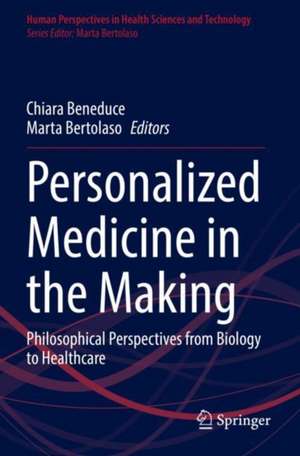Personalized Medicine in the Making: Philosophical Perspectives from Biology to Healthcare: Human Perspectives in Health Sciences and Technology, cartea 3
Editat de Chiara Beneduce, Marta Bertolasoen Limba Engleză Paperback – 9 mar 2023
Chapter 16, “The Impact of Fantasy” is available open access under a Creative Commons Attribution 4.0 International License via link.springer.com.
| Toate formatele și edițiile | Preț | Express |
|---|---|---|
| Paperback (1) | 396.09 lei 3-5 săpt. | +25.36 lei 4-10 zile |
| Springer International Publishing – 9 mar 2023 | 396.09 lei 3-5 săpt. | +25.36 lei 4-10 zile |
| Hardback (1) | 651.51 lei 3-5 săpt. | |
| Springer International Publishing – 8 mar 2022 | 651.51 lei 3-5 săpt. |
Preț: 396.09 lei
Preț vechi: 477.21 lei
-17% Nou
Puncte Express: 594
Preț estimativ în valută:
75.79€ • 79.14$ • 62.59£
75.79€ • 79.14$ • 62.59£
Carte disponibilă
Livrare economică 25 martie-08 aprilie
Livrare express 08-14 martie pentru 35.35 lei
Preluare comenzi: 021 569.72.76
Specificații
ISBN-13: 9783030748067
ISBN-10: 3030748065
Pagini: 326
Ilustrații: XIX, 326 p. 1 illus.
Dimensiuni: 155 x 235 x 20 mm
Greutate: 0.58 kg
Ediția:1st ed. 2022
Editura: Springer International Publishing
Colecția Springer
Seria Human Perspectives in Health Sciences and Technology
Locul publicării:Cham, Switzerland
ISBN-10: 3030748065
Pagini: 326
Ilustrații: XIX, 326 p. 1 illus.
Dimensiuni: 155 x 235 x 20 mm
Greutate: 0.58 kg
Ediția:1st ed. 2022
Editura: Springer International Publishing
Colecția Springer
Seria Human Perspectives in Health Sciences and Technology
Locul publicării:Cham, Switzerland
Cuprins
Part I: Personalized Medicine and Complex Diseases.- Chapter 1. Personalized Treatments: Where Patient’s History and Biological Background Meet (Mariano Bizzarri).- Chapter 2. Why Precision Oncology is not Very Precise (and why this should not surprise us) (Anya Plutynski).- Chapter 3. Conceptual and Theoretical Specifications towards Accuracy in Medicine (Maël Montévil).- Part II: Personalized Medicine and Nutrition.- Chapter 4. Personalized Nutrition: Overrated or Misconceived? (Vincenzo Fogliano et al).- Part III: Personalized Medicine and New Bio-technologies.- Chapter 5. Drug Safety and Personalized Medicine: a Possible Interaction through E-Synthesis? (Francesco De Pretis et al).- Chapter 6. Organoids and Mouse Avatars in Personalized Medicine – Towards a Science of the Individual? (Sara Green).- Part IV: Personalized Medicine and Ethics of Innovation.- Chapter 7. From Ecogenetics to Exposomics: What is New in Molecular Epidemiology? (Xavier Guchet).- Chapter 8. Personalized Medicine and Research Biobanking: from Traditional Informed Consent to Participatory governance (Antonella Ficorilli).- Chapter 9. A GDPR-compliant blockchain-based system for sharing synthetic data and for computation “bringing the algorithms to the data” (Edwin Fletcher).- Part V: Personalized Medicine: the Societal and Economical Impact.- Chapter 10. U.S. Opioid Epidemic: An Integral Approach to Prevention, Treatment, and Prognosis (Maria Sophia Aguirre).- Chapter 11. TBA (Roger Strand).- Chapter 12. TBA (Massimo Ciccozzi).
Notă biografică
Chiara Beneduce is a postdoctoral researcher at the Center for the History of Philosophy and Science of Radboud University, Nijmegen (The Netherlands) and teaching assistant in the Philosophy of Science at Campus Bio-Medico University of Rome (Italy). Her research is placed at the intersection of the History of Philosophy, the History of Science, and the Philosophy of Medicine. Her research is currently supported by the NWO-Veni Grant number VI.Veni.191F.005 for the project “The Sense of Touch. From Anomaly to Paradigm”.
Marta Bertolaso is Professor of Philosophy of Science at Campus Bio-Medico University of Rome (Italy) and Adjunct Professor at the University of Bergen in collaboration with the CCBIO (Centre for Cancer Biomarkers). After a degree in Biological Sciences and some years in the lab, she developed her academic career in the Philosophy of the Life Sciences. Her expertise in especially in the philosophy of cancer, scientific practiceand the philosophy of complex organized systems. Supported by visiting or scholar fellowships, she has worked in prestigious international research centers for the Philosophy of Science in Pittsburgh (PA, USA), Exeter (UK), Paris (France), Vienna (Austria), and Milan (e.g. IFOM of the European Oncology Institute).
Marta Bertolaso is Professor of Philosophy of Science at Campus Bio-Medico University of Rome (Italy) and Adjunct Professor at the University of Bergen in collaboration with the CCBIO (Centre for Cancer Biomarkers). After a degree in Biological Sciences and some years in the lab, she developed her academic career in the Philosophy of the Life Sciences. Her expertise in especially in the philosophy of cancer, scientific practiceand the philosophy of complex organized systems. Supported by visiting or scholar fellowships, she has worked in prestigious international research centers for the Philosophy of Science in Pittsburgh (PA, USA), Exeter (UK), Paris (France), Vienna (Austria), and Milan (e.g. IFOM of the European Oncology Institute).
Textul de pe ultima copertă
This book offers a multidisciplinary look at the much-debated concept of “personalized medicine”. By combining a humanistic and a scientific approach, the book builds up a multidimensional way to understand the limits and potentialities of a personalized approach in medicine and healthcare. The book reflects on personalized medicine and complex diseases, the relationship between personalized medicine and the new bio-technologies, personalized medicine and personalized nutrition, and on some ethical, political, economic, and social implications of personalized medicine. This volume is of interest to researchers from several disciplines including philosophy, bio-medicine, and the social sciences.
Chapter 16, “The Impact of Fantasy” is available open access under a Creative Commons Attribution 4.0 International License via link.springer.com.
Caracteristici
Brings together a group of top scholars on the debated concept of “personalized medicine” Addresses the the topics from a multidisciplinary point of view Shows how a broad interpretation of "personalized medicine" can empower its high potential for improving healthcare





